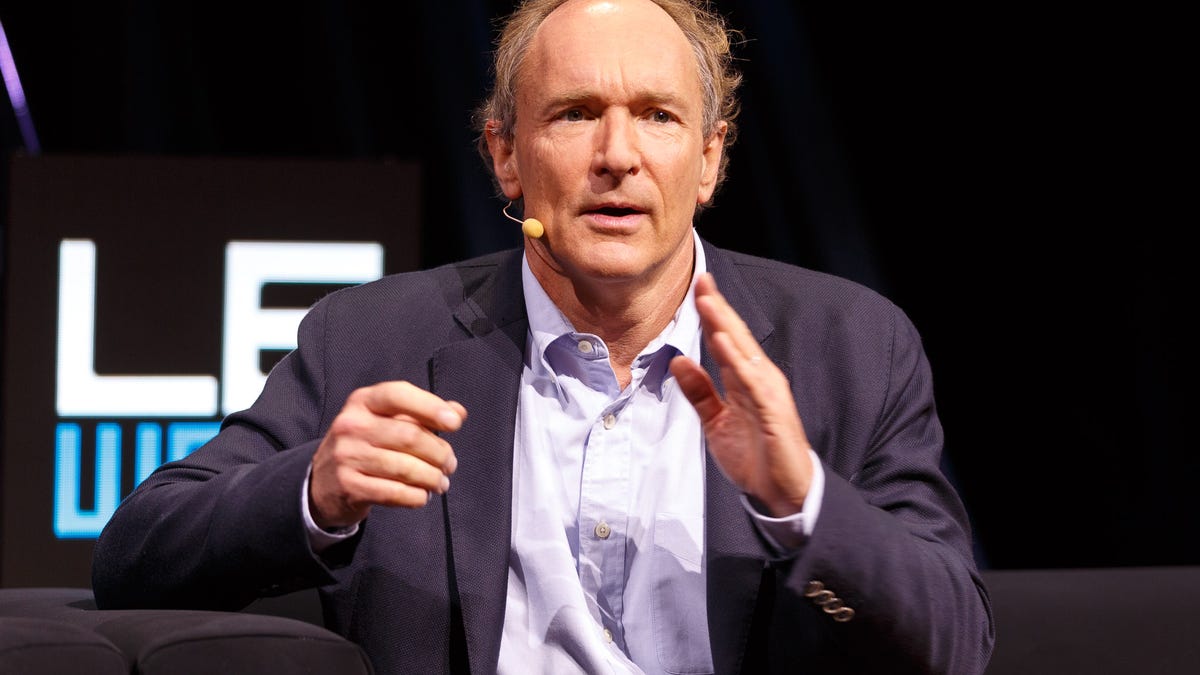Web inventor Tim Berners-Lee wins top computing prize
The World Wide Web, just 28 years old, is a stunning achievement -- even if bogus information and mobile apps are undermining its influence.

Web founder Tim Berners-Lee, shown here in 2014, has been honored with the A.M. Turing Award.
Tim Berners-Lee, who invented the World Wide Web less than three decades ago, has won the top computing industry prize just as his wildly successful invention is challenged by new mobile technology.
The Association of Computing Machine granted Berners-Lee the 2016 A.M. Turing Award on Tuesday, an honor that carries a $1 million prize as well as plenty of prestige. It's named for Alan Turing, the UK researcher who helped to crack Germany's Enigma code in World War II and who was instrumental in conceiving the fundamental design of computers.
Berners-Lee created the web's two seminal components: HTML (Hypertext Markup Language), the rules for describing how to construct a web page, and HTTP (Hypertext Transfer Protocol), which governs how a web browser fetches a web page from a website. He also came up with the URL (Uniform Resource Locator), which gives everything on the web an address. Together, the three technologies mean you can click or tap hyperlinks to hop endlessly across the world's gargantuan repository of information.
Some of the ideas had been kicking around academia, but Berners-Lee refined them and transformed them into something practical: a way for researchers at the CERN particle accelerator laboratory near Geneva, Switzerland, to share information.
That foundation has grown dramatically, making possible phenomena like Google's search engine and Facebook's social networking. There was just a single website when Berners-Lee launched http://info.cern.ch on August 6, 1991. Network monitoring firm Netcraft counted more than 1.76 billion websites in March.
A lot of work went into launching that original website. Berners-Lee first published his web technology proposal on March 12, 1989 -- the date considered the birthday of the web.
The web is notable for being built largely on open standards anybody can implement without paying a cent -- a strong contrast to how the software and networking businesses worked in the 1980s and 1990s. Companies like Google hold a lot of power, but still today, no single company controls the web the way Apple controls what you can see or do on an iPhone .
Challenges: fake news and mobile phones
It's a striking success, but the web's future is by no means assured. The web often remains slow or awkward on mobile phones, devices that grow more important each year in our digital lives and that are the only computing device that millions of people worldwide own.
The apps we use often sidestep the web. You can't post a funny video to Snapchat or hail an Uber car with the web. And even when we view websites on our phones, for example by tapping a link shared in Twitter or Facebook apps, the website often opens within the app instead of in a full-fledged web browser.
Berners-Lee's invention faces another, more significant problem as well. Bogus information floods the web, perhaps most notably the "fake news" that plagued the 2016 US presidential election.
"Looking at recent events, we have very dysfunctional systems on the web," Berners-Lee said in a statement. "While it has achieved tremendous strides, the web isn't uniquely affirmed as a medium for the spread of truth and goodwill; it is also a medium for the spread of untruths and hatred."
Fighting back
Web fans and companies are taking action. Facebook and Mozilla, for example, are working with journalism partners to form the News Integrity Initiative. Facebook sometimes alerts you when it thinks you're about to post a link to a bogus piece, and Google has been refining its algorithms to suppress bogus information and spotlight fact checking.
At the same time, browser makers and web developers are taking on the app challenge with technology that makes websites more interactive. Online video chat on the web is now ordinary, and newer standards like Service Worker power technology known as progressive web apps, which are designed to work better on mobile devices in particular.
Earlier Turing Award winners include Vint Cerf and Robert Kahn, who co-created the internet; Douglas Engelbart, who invented the computer mouse; Ken Thompson and Dennis Ritchie, who crafted the Unix operating system; Whitfield Diffie and Martin Hellman, who invented public key cryptography now instrumental to e-commerce and private communications; Len Adleman, Ron Rivest and Adi Shamir, who made that public key cryptography practical to use; and Ivan Sutherland, who pioneered graphical user interface technology.
Correction, 12:00 p.m. PT: Corrects spelling of Douglas Engelbart's name.
Tech Enabled: CNET chronicles tech's role in providing new kinds of accessibility.
Special Reports: CNET's in-depth features in one place.

